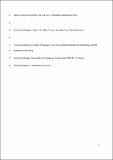Higher songs of city birds may not be an individual response to noise
Abstract
It has been observed in many songbird species that populations in noisy urban areas sing with a higher minimum frequency than do matched populations in quieter, less developed areas. However, why and how this divergence occurs is not yet understood. We experimentally tested whether chronic noise exposure during vocal learning results in songs with higher minimum frequencies in great tits (Parus major), the first species for which a correlation between anthropogenic noise and song frequency was observed. We also tested vocal plasticity of adult great tits in response to changing background noise levels by measuring song frequency and amplitude as we changed noise conditions. We show that noise exposure during ontogeny did not result in songs with higher minimum frequencies. In addition, we found that adult birds did not make any frequency or song usage adjustments when their background noise conditions were changed after song crystallization. These results challenge the common view of vocal adjustments by city birds, as they suggest that either noise itself is not the causal force driving the divergence of song frequency between urban and forest populations, or that noise induces population-wide changes over a time scale of several generations rather than causing changes in individual behaviour.
Citation
Zollinger , S A , Slater , P J B , Nemeth , E & Brumm , H 2017 , ' Higher songs of city birds may not be an individual response to noise ' , Proceedings of the Royal Society B: Biological Sciences , vol. 284 , no. 1860 , 20170602 . https://doi.org/10.1098/rspb.2017.0602
Publication
Proceedings of the Royal Society B: Biological Sciences
Status
Peer reviewed
ISSN
0962-8452Type
Journal article
Description
Funding was provided by the BBSRC (award BB/E003494/1) to P.J.B.S. and H.B. and the DFG (awards BR 2309/7-1, BR 2309/8-1) to H.B. Data are archived at the Dryad Digital Repository (http://dx.doi.org/10.5061/dryad.fc10f)Collections
Items in the St Andrews Research Repository are protected by copyright, with all rights reserved, unless otherwise indicated.

